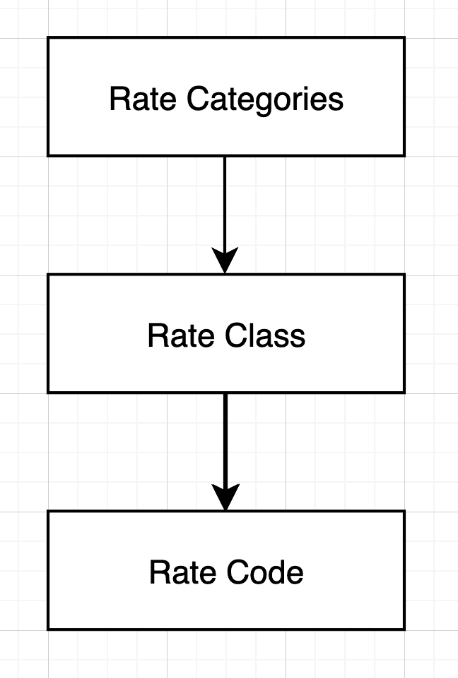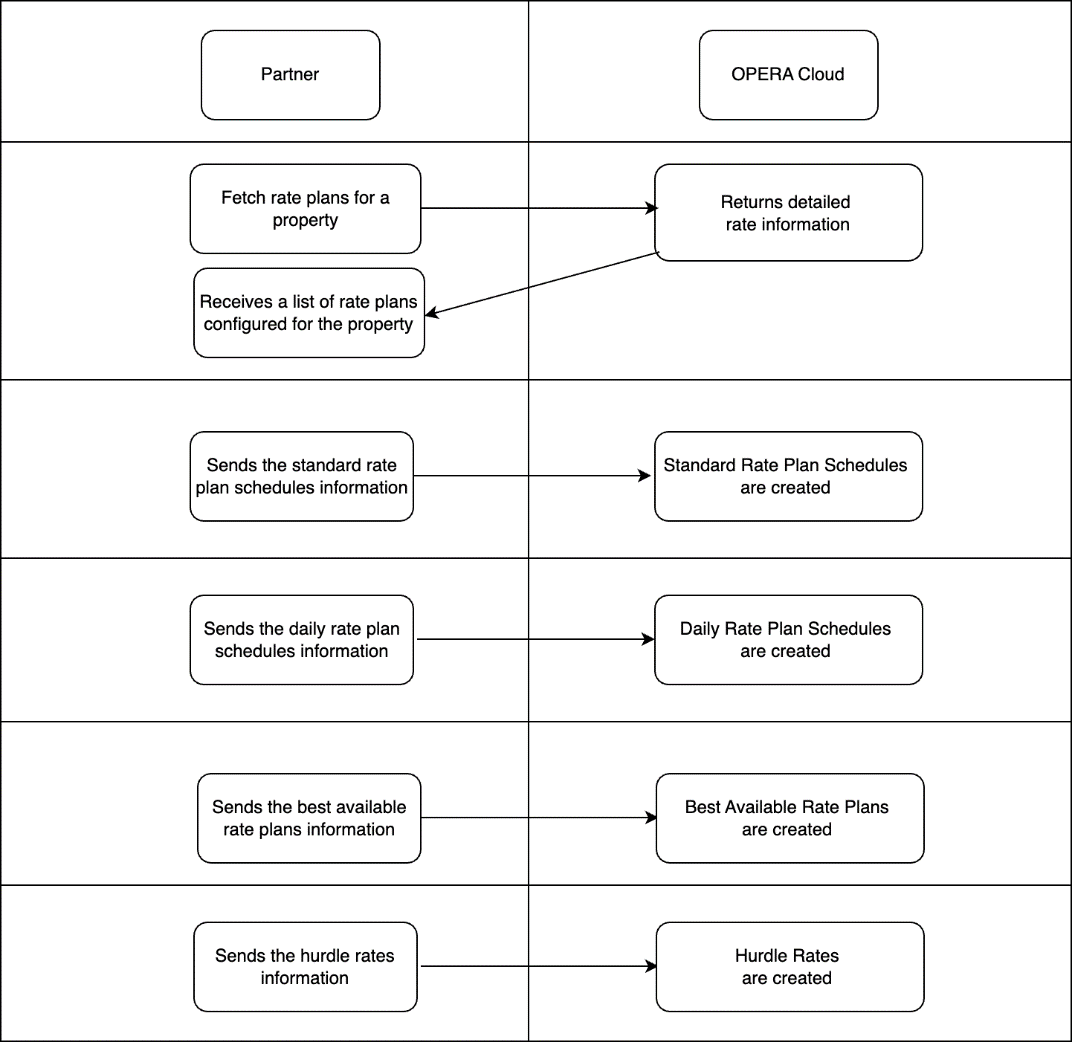Rate Management
Rate management in OPERA Cloud involves setting and adjusting room rates to maximize revenue and occupancy. This includes creating rate plans, dynamic pricing adjustments, and retrieving best available rates and hurdle rates for optimized pricing.
Rate Structure in OPERA Cloud
OPERA Cloud rate structure is divided into Rate Class, Rate Category, and Rate Code. Rate categories are high-level classifications that group various rate codes into broader categories. They help in organizing and managing rates more effectively. Examples of Rate Categories could be Corporate, Leisure, and so on. Rate classes are more granular and specific classifications within the rate structure. They can be used to define specific characteristics or attributes of rates within a category. Examples of rate classes could be Negotiate, Wholesale, Discounted, and so on. You must define one or more rate classes and a rate class is then associated to each Rate Category. Rate classes can be used to query rates from OPERA Cloud. For more information on the complex Rate Structures in OPERA Cloud, refer to Configuring Rate Classes in the OPERA Cloud User Guide.
Figure 4-4 Rate Structure in OPERA Cloud

Hurdles in OPERA Cloud
Hurdle Rates represent the monetary hurdle value calculated by the revenue management solution after considering the information received from OPERA Cloud. This is the value that must be reached for OPERA Cloud to display a rate code/room type on the rate grid. For more information, refer to the Hurdle Rates topic in the OPERA Cloud User Guide.
Use Cases
| Use Case | Description | Operation |
|---|---|---|
| Retrieving Rate Plans for a property | You can retrieve a list of rate plans for a specified property, including options to filter inactive rate plans and include detailed rate information. | getRatePlans |
| Creating/Updating the Standard Rate Plan Schedules | You can add and or/update standard rate plans for a specified property. You can add new standard rate plan schedules, including detailed rate information and options to define specific attributes for each schedule. By dynamically adjusting room rates based on factors like demand, occupancy, and market conditions, rate plan schedules help optimize revenue and ensure competitive pricing. | postRatePlanSchedules |
| Creating/Updating the Daily Rate Plan Schedules | You can add and/or update the rate price schedule to existing OPERA Daily Rate plans. Rate Plan Schedules can dynamically adjust room rates based on various factors, such as demand, occupancy, and market conditions. This helps in optimizing revenue and maintaining competitive pricing. | startSetDailyRatePlanSchedulesProcess |
| Creating/Updating the Best Available Rate Plans | You can create/update the Best Available Rate Plans by Length of Stay or by Day by posting them to OPERA Cloud. This helps in dynamically offering the most competitive and optimized pricing to guests based on their intended stay duration. | startSetBestAvailableRatePlansProcess |
| Creating Hurdle Rates | Hurdle Rates represent the monetary hurdle value calculated by the revenue management solution after considering the information received from OPERA Cloud. You can create Hurdle Rates by posting them to OPERA Cloud. This can help in managing revenue by setting pricing thresholds that prevent underselling during high demand periods. | startHurdleRatesProcess |
Figure 4-5 Rate Management Workflow

1. Retrieving Rate Plans for a property
The synchronous operation getRatePlans in OPERA Cloud allows users to retrieve a list of rate plans for a specified property. This operation includes options to filter the rate plans based on active/inactive status and to include rate information if required. This is essential for revenue management systems (RMS) to analyze and manage different pricing strategies and packages offered by the hotel.
| Business Logic | Comments |
|---|---|
| Retrieving Rate Plans for a property |
You can retrieve the rate plans information based on the following parameters:
|
| Key response data elements |
The key response data elements include:
|
| Sample API request/response |
getRatePlans |
2. Creating/Updating the Standard Rate Plan Schedules using postRatePlanSchedules
Standard Pricing Schedules in OPERA Cloud enable you to manage daily rates for each room type on a daily basis. You can also select one or more package items for a pricing schedule if it is required for offering a special entitlement for specific room types / date ranges only. For example, you might wish to include Champagne in the rate only for the Executive Suite; the package item is then added at the pricing schedule level and not for the entire rate code (all room types).
The synchronous operation postRatePlanSchedules is used to set or update standard daily rate plan schedules for a specified date range. This information includes rate amounts for different occupancy levels, room types, and special conditions.
| Business Logic | Comments |
|---|---|
| Posting the standard rate plan schedules |
You can set or update the standard rate plan schedules using specific parameters for a given date range:
The rate plan schedule can be posted with the following details:
|
| Key Considerations |
|
| Validation | Validate the applied standard rate plan schedules through the RMS to ensure they match the intended configurations. |
| Sample API request/response |
postRatePlansSchedules |
3. Creating/Updating the Daily Rate Plan Schedules using startSetDailyRatePlanSchedulesProcess
Daily rates are identified by the Rate Category of Daily. The asynchronous operation startSetDailyRatePlanSchedulesProcess is used to set or update daily rate plan schedules for a specified date range. This information includes rate amounts for different occupancy levels, room types, and special conditions. The data is essential for implementing dynamic pricing strategies, ensuring competitive rates, and optimizing revenue. It can be utilized for operational planning, revenue forecasting, and detailed rate management reporting.
| Business Logic | Comments |
|---|---|
| Posting the daily rate plan schedules |
The daily rate plan schedules can be requested using specific parameters to set or update the rate plan schedules for a specified date range:
You can send the specific rate plan schedule to be posted with the following information:
|
| Key Considerations |
|
| Validation | Validate the applied daily rate plan schedules through the RMS to ensure they match the intended configurations. |
| Sample API request/response |
1. startSetDailyRatePlanSchedulesProcess 2. getDailyRatePlanSchedulesProcessStatus 3. getDailyRatePlanSchedules |
4. Creating/Updating the Best Available Rate Plans using startSetBestAvailableRatePlansProcess
The asynchronous operation startSetBestAvailableRatePlansProcess can be used to set or update the best available rate plans for specified lengths of stay (LOS). This information includes rate plan codes and applicable dates, which are crucial for offering competitive and optimized pricing to guests. The data can be utilized for dynamic pricing adjustments, enhancing revenue management strategies, and ensuring that the most attractive rates are available for different stay durations.
| Business Logic | Comments |
|---|---|
| Posting the best available rate plans |
The best available rate plans can be set using specific parameters to determine the most competitive rates for specified lengths of stay (LOS):
You can send the specific rate plan schedule to be posted with the following information:
|
| Key Considerations |
|
| Validation | Validate the applied best available rate plans through the RMS to ensure they match the intended configurations. |
| Sample API request/response |
1. startSetBestAvailableRatePlansProcess startSetBestAvailableRatePlansProcess 2. getBestAvailableRatePlansProcessStatus 3. getBestAvailableRatePlans |
5. Creating Hurdle Rates using startHurdleRatesProcess
The asynchronous operation startHurdleRatesProcess is used to set or update hurdle rates for a property. This information is crucial for maintaining pricing integrity, maximizing revenue, and strategically managing room availability. The data can be utilized for revenue management, demand forecasting, and operational planning.
| Comments | |
|---|---|
| Posting the hurdle rates |
The hurdle rates can be set using specific parameters to establish the minimum acceptable rates for room bookings:
You can send the specific hurdle rate details to be posted with the following information:
|
| Key Considerations |
|
| Validation | Validate the applied hurdle rates through the RMS to ensure they align with the intended configurations and revenue strategies. |
| Sample API request/response |
1. startHurdleRatesProcess startHurdleRatesProcess
2. getHurdleRatesProcessStatus getHurdleRatesProcessStatus 3. getHurdleRates getHurdleRates |
Parent topic: RMS Use Cases